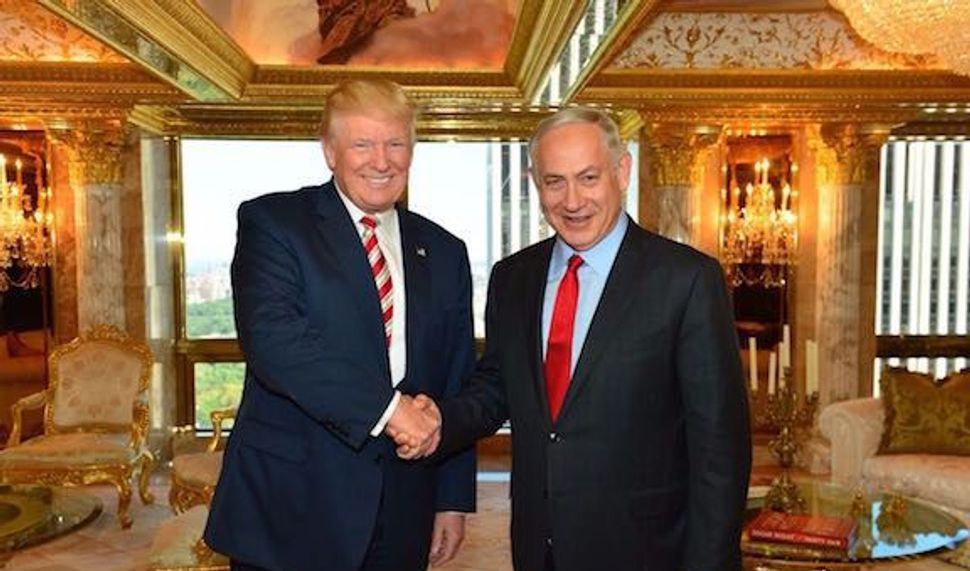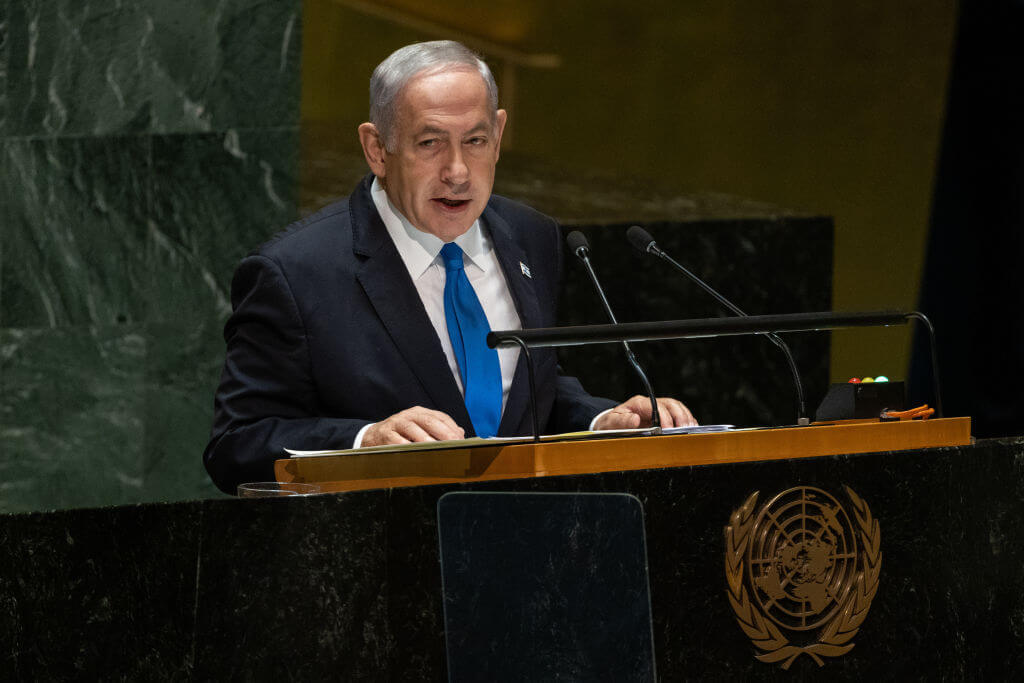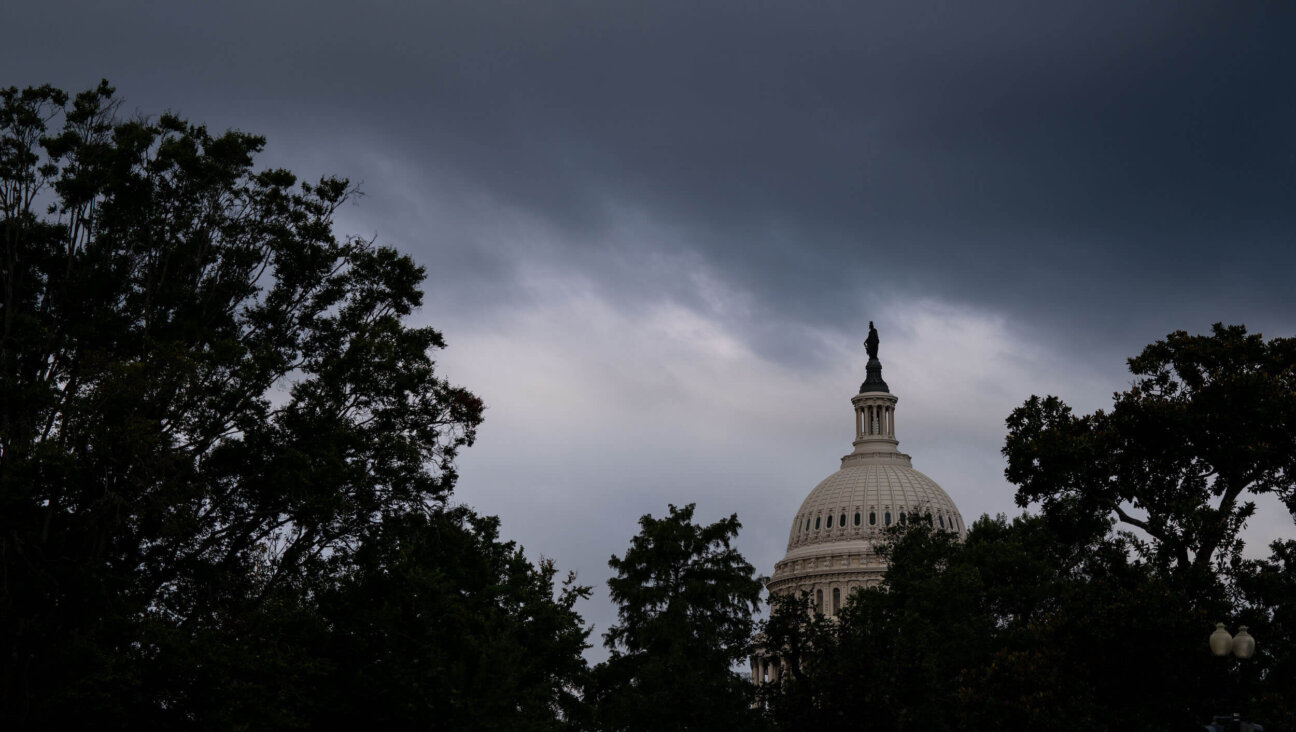The Surprising Thing Bibi Whispers in Trump’s Ear

Donald Trump and Benjamin Netanyahu after their September 25 meeting in New York Image by Donald J. Trump Campaign
President Donald Trump and Prime Minister Benjamin Netanyahu of Israel recently held their first face-to-face meeting in Washington. After years of combative relations between Israel and the Obama administration, the two leaders demonstrated the casual repartee of old friends. “Bibi and I have known each other a long time,” Trump said. “A smart man, a great negotiator, and I think we are going to make a deal. It might be a bigger and better deal than people in this room even understand.” In turn, Netanyahu joked about the “art of the deal” and noted that there are no matters in which he and the president “did not see eye to eye).”
Netanyahu has welcomed a Trump presidency, saying that he looks forward to working with a “true friend in the White House.” But despite the friendly talk, Trump’s embrace of Netanyahu could prove to be a political liability for the prime minister.
In their joint press conference, Trump equivocated on the two-state-solution, abandoning long-held American policy, saying the parties can have “whatever they want.” During the campaign, and as President-elect, Trump supported the expansion of Jewish settlements in the West Bank, proposed moving the American embassy to Jerusalem, and put forward his bankruptcy lawyer, David Friedman, as his pick for ambassador to Israel. Friedman, an Orthodox Jew, is the chairman of American Friends of Beit El, a radical Jewish settlement, and is openly hostile to a two-state solution. (It recently emerged that Trump donated $10,000 to Beit El in honor of Friedman). Trump was also deeply critical of the outgoing administration’s refusal to veto UN resolution 2334, which condemned settlement expansion.
Many of these statements mirror Netanyahu’s own rhetoric. But, contrary to popular belief, a free hand from an American president does not benefit him. While this may seem counterintuitive, it makes sense in the logic of Israeli coalition politics.
Netanyahu today sits atop what has been described as the most right-wing government in Israel’s history. His most important partners have long pressured him to pursue the same types of expansionist policies that Trump espoused before becoming president. But Netanyahu knows that giving in to these demands would come at an enormous cost – including diplomatic and economic sanctions from European and Arab partners, emboldening the Boycott Divestment and Sanctions (BDS) movement, increasing alienation from the largely moderate Jewish diaspora, a further weakening of the unstable Palestinian Authority, and the very real risk of increased terror.
Netanyahu owes his political longevity to playing his various challengers off each other, particularly left against right. He has been playing what Harvard political scientist Robert Putnam calls a “two-level game,” using external constraints as an excuse to talk tough while reigning in his domestic coalition partners. Indeed, he has remained in office longer than any other Israeli head of state, including founding Prime Minister David Ben Gurion, in part by leveraging the constraints imposed by the Obama administration as a bulwark against his political rivals.
Carte blanche from Trump would compromise Netanyahu’s ability to maintain the status quo under which he has thrived. If elections were held today, polls suggest that Netanyahu would likely end up in third place, behind his coalition partner, Naftali Bennet, who outflanks him on the right, and the popular centrist Yair Lapid.
In the short time since assuming office Trump has moderated some of his previous positions, bringing them more closely in line with previous administrations. In their recent meeting, he proclaimed his determination to broker a “deal” between Israelis and Palestinians, telling Netanyahuthat, “both sides will have to make compromises – you know that, right?”. And Trump has suggested that Israel “hold back on settlements” and delayed relocating the American embassy to Jerusalem.
While Netanyahu’s talk is tough, he may very well be whispering in Trump’s ear, begging him to back off some of his more bombastic promises.
Netanyahu has been accused by right wingers of orchestrating the delay, and a story in Reuters suggests that Trump is now proceeding more cautiously because of concerns raised by Israeli officials. Meanwhile, Netanyahu continues to make public pronouncements that the embassy belongs in Jerusalem. This serves as a prime example of how he maneuvers: Publicly proclaiming to support a more right-wing agenda while privately working to moderate both actions and expectations.
One might think that Trump’s about face on Israel would cause Netanyahu serious consternation, but it may in fact come as a relief.
Jamie Levin and Sarah Treleaven are based in Jerusalem. Jamie is a post-doctoral fellow in International Relations at the Hebrew University and Sarah is a freelance journalist.
A message from our CEO & publisher Rachel Fishman Feddersen

I hope you appreciated this article. Before you go, I’d like to ask you to please support the Forward’s award-winning, nonprofit journalism during this critical time.
We’ve set a goal to raise $260,000 by December 31. That’s an ambitious goal, but one that will give us the resources we need to invest in the high quality news, opinion, analysis and cultural coverage that isn’t available anywhere else.
If you feel inspired to make an impact, now is the time to give something back. Join us as a member at your most generous level.
— Rachel Fishman Feddersen, Publisher and CEO























